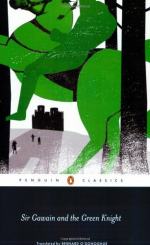|
|
Sir Gawain and the Green Knight Topic Tracking: Courage
Part 1, lines 250-490
Courage 1: Even while all of the knights in the court are presented as quaking with fear at the sight of the Green Knight, Arthur is presented as standing quietly by and handling adversity coolly and calmly, mythical hero that he is.
Courage 2: The Green Knight shows here for the first time his absolute steadfastness in the face of physical danger - a fact that will become important later as Gawain struggles to live up to the same ideal in the face of the knight himself. The Green Knight is an imposing ideal, and Gawain is asked to live up to mythical standards; there is an important juxtaposition here with the reaction of the Knights of the Round Table (see Fear 3).
Courage 3: The first part of the poem ends with an almost palpable challenge, not from the Arthurian knights, or even the Green Knight, but from the poet writing the story. In creating this legend, he has placed the ideals and assumption of knightly chivalry in jeopardy with such a difficult test of will. The gravity of the test and the doubt of the supposedly steadfast hero to succeed is brought home with this break in voice and narrative distance.
Part 2, lines 491-810
Courage 4: This is the only explicit reference in the poem to Gawain's fighting skills, and it is condensed into a very small space (lines 715-726), odd for a poem which is, if only on the surface, a traditional courtly romance. Nevertheless, Gawain is presented here as steadfastly overcoming terrible odds and terrible foes with his powers of strength, faith, and justice.
Part 3, lines 1126-1557
Courage 5: Each day that the lord Bercilak goes out hunting, his absolute courage (and thus knightly worthiness) is applauded. Here on the fist day of hunting, this is presented as the ease with which the lord kills deer, and the sheer joy he takes in the act of killing.
Part 3, lines 1558-1997
Courage 6: The scene is set so that the lord becomes the undisputed winner of the day, and in several ways. Not only does he kill the boar single-handed, he defends his courage in the face of insurmountable odds, for all of the other men there were cringing with fear at the boar.
Part 4, lines 1998-2308<
Courage 7: Although Gawain seems to have quite a laid back attitude about fate here, he nevertheless has taken great pains to convince himself of his own invincibility without the help of God or divine justification. To take his words without a grain of irony would be circumspect, even if he truly believes what he says. Actions speak louder than words, and the poet knows this.
Part 4, lines 2309-2530
Courage 8: There is a sort of implicit reversal here from the assumed identities of hero/villain. The supposed super-hero, as we have seen, takes on the role of imperfect man on a moral quest, and the supposed villain becomes (and has been all along) his mentor in that quest. Gawain recognizes this and accepts it at this point; he acknowledges his imperfections and also the fact that this man, the Green Knight, is superior to himself and is capable of teaching him to become better.




